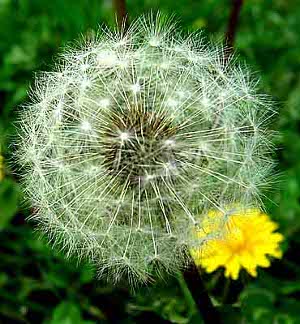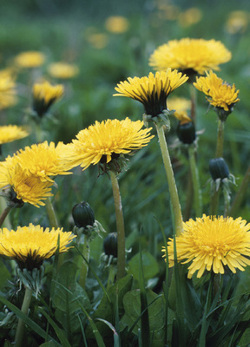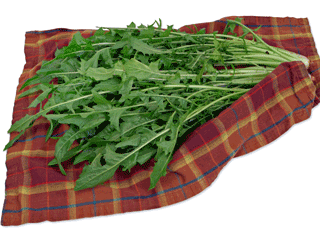| Share |  |
 | |||
God's Good Herbs - Dandelion
 Dandelions are considered by most as a pesky weed that blooms in the spring where it is not planted. French botanists, who thought the leaves of the dandelion resembled the teeth of a lion, named the plant 'dents de lion" which evolved to 'dandelion" over time. You may be surprised to learn that the Latin name for these hardy perennials, with deeply notched tooth like leaves and bright yellow flowers, is Taraxacum officinale, meaning 'Official Remedy for Disorders." The flowers, leaves and roots of this plant are edible and used for a variety of culinary and medicinal purposes. Dandelion has been a trusted liver and kidney remedy for centuries and is one of the top six herbs used in Chinese medicine. Extracts of dandelion were also used by Native Americans to treat such things as kidney disease, swelling, skin problems, heartburn and digestive disorders.
Dandelions are considered by most as a pesky weed that blooms in the spring where it is not planted. French botanists, who thought the leaves of the dandelion resembled the teeth of a lion, named the plant 'dents de lion" which evolved to 'dandelion" over time. You may be surprised to learn that the Latin name for these hardy perennials, with deeply notched tooth like leaves and bright yellow flowers, is Taraxacum officinale, meaning 'Official Remedy for Disorders." The flowers, leaves and roots of this plant are edible and used for a variety of culinary and medicinal purposes. Dandelion has been a trusted liver and kidney remedy for centuries and is one of the top six herbs used in Chinese medicine. Extracts of dandelion were also used by Native Americans to treat such things as kidney disease, swelling, skin problems, heartburn and digestive disorders.
Dandelions are a rich source of many nutrients, ranking in the top four of green vegetables in overall nutritional value. It is actually the richest source of beta-carotene of any green vegetable and only two other food sources have higher vitamin A content - cod liver oil and beef liver. It also supplies B vitamins such as thiamine (B1) and riboflavin (B12) as well as vitamins C, D and E. It is particularly rich in fiber, potassium, iron, calcium, magnesium, phosphorus as well as micronutrients such as copper, cobalt, zinc and boron.
Potential Health Benefits
The bitter substances in dandelion roots stimulate the production of bile in the gallbladder and the flow of bile in the liver, improving function in both organs. Bile is used in the digestive system to break down fats, enabling them to be digested and absorbed more effectively. This action helps to reduce the effects of fatty foods such as heartburn and acid indigestion and improves fat metabolism as well. Dandelion also contains pectin, which is often used in formulas to accomplish heavy metal detoxification. Dandelion roots are considered a potent liver tonic in Europe and are recommended by herbalists everywhere as a great aid to cleanse and detoxify the blood and liver and to promote better gastrointestinal health.
 The leaves of dandelion are considered an effective diuretic in that they promote the excretion of sodium and water from the kidney. In addition, common side effects of potassium depletion experienced with medicinal diuretics do not occur since dandelion's high concentration of potassium replenishes whatever is lost in the urine. This effect can be helpful with alleviating water build up associated with PMS. Also, as sodium and water is excreted, blood volume is reduced which, in turn, reduces blood pressure. It has been found that potassium, along with magnesium and calcium, influence the ability of blood vessels to relax which also assists in lowering blood pressure. Food sources of this mineral found in dandelion, are more beneficial in this process than supplements.
The leaves of dandelion are considered an effective diuretic in that they promote the excretion of sodium and water from the kidney. In addition, common side effects of potassium depletion experienced with medicinal diuretics do not occur since dandelion's high concentration of potassium replenishes whatever is lost in the urine. This effect can be helpful with alleviating water build up associated with PMS. Also, as sodium and water is excreted, blood volume is reduced which, in turn, reduces blood pressure. It has been found that potassium, along with magnesium and calcium, influence the ability of blood vessels to relax which also assists in lowering blood pressure. Food sources of this mineral found in dandelion, are more beneficial in this process than supplements.
Studies conducted with diabetic mice indicated an active chemical constituent found in dandelion, inulin, may help normalize blood glucose levels. Inulin converts to fructose in the stomach and forms glycogen in the liver without requiring insulin, resulting in a slower blood sugar rise. Dandelion is also believed to have anti-tumor properties and may inhibit formation of tumors by stimulating cancer fighting immune cells. Other conditions dandelion has benefited include lack of appetite, aching joints, skin problems and respiratory disorders.
 Uses and Cautions
Uses and Cautions
The culinary uses of dandelions are varied. When its leaves are tender in the spring, they make a great addition to salads or they can be cooked like spinach or other greens. The roots can be washed, dried and ground, and steeped in hot water to make a coffee-like drink. Dandelion is also roasted and used as an ingredient in coffee substitutes available at health food stores. Herbal teas are made from the dried leaves of the plant. The flower petals can also be eaten, however they are more commonly used to make dandelion wine. Dandelion supplements in the form of extracts and capsules are also available online or in health food stores.
Dandelion has no harmful side effects and is included in the Food and Drug Administration's list of herbs generally regarded as safe. However, it should not be taken by those already taking prescription diuretics. Eating too much of the roots can have a mild laxative effect. The only other caution concerning using dandelion would be to avoid consuming ones picked from any area where chemical pesticides and lawn treatments have been used.
Copyright © 2008-2015 Lucinda Bedogne, CNHP, CNC
Post Your Comment...
|
|
||||||||||||


